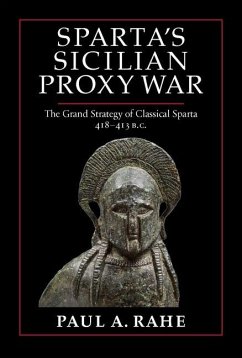The great expedition to Sicily described in the sixth and seventh books of Thucydides' history can be depicted in a variety of ways. By some, it has been thoughtfully treated as an example of overreaching on the part of the Athenians. By others, it has been singled out as a sterling example of patriotism, courage, and grit on the part of the Syracusans. Never until now, however, has anyone examined this conflict from a Spartan perspective - despite the fact that Lacedaemon was the war's principal beneficiary and that her intervention with the dispatch of a single Spartiate turned the tide and decided the outcome. In Sparta's Sicilian Proxy War, Paul Rahe first outlines the struggle's origins and traces its progress early on, then examines the reasons for Sparta's intervention, analyzes the consequences, and retells the story of Athens' ignominious defeat. Rarely in human history has a political community gained so much at so little cost through the efforts of a single man.
Hinweis: Dieser Artikel kann nur an eine deutsche Lieferadresse ausgeliefert werden.
Hinweis: Dieser Artikel kann nur an eine deutsche Lieferadresse ausgeliefert werden.








